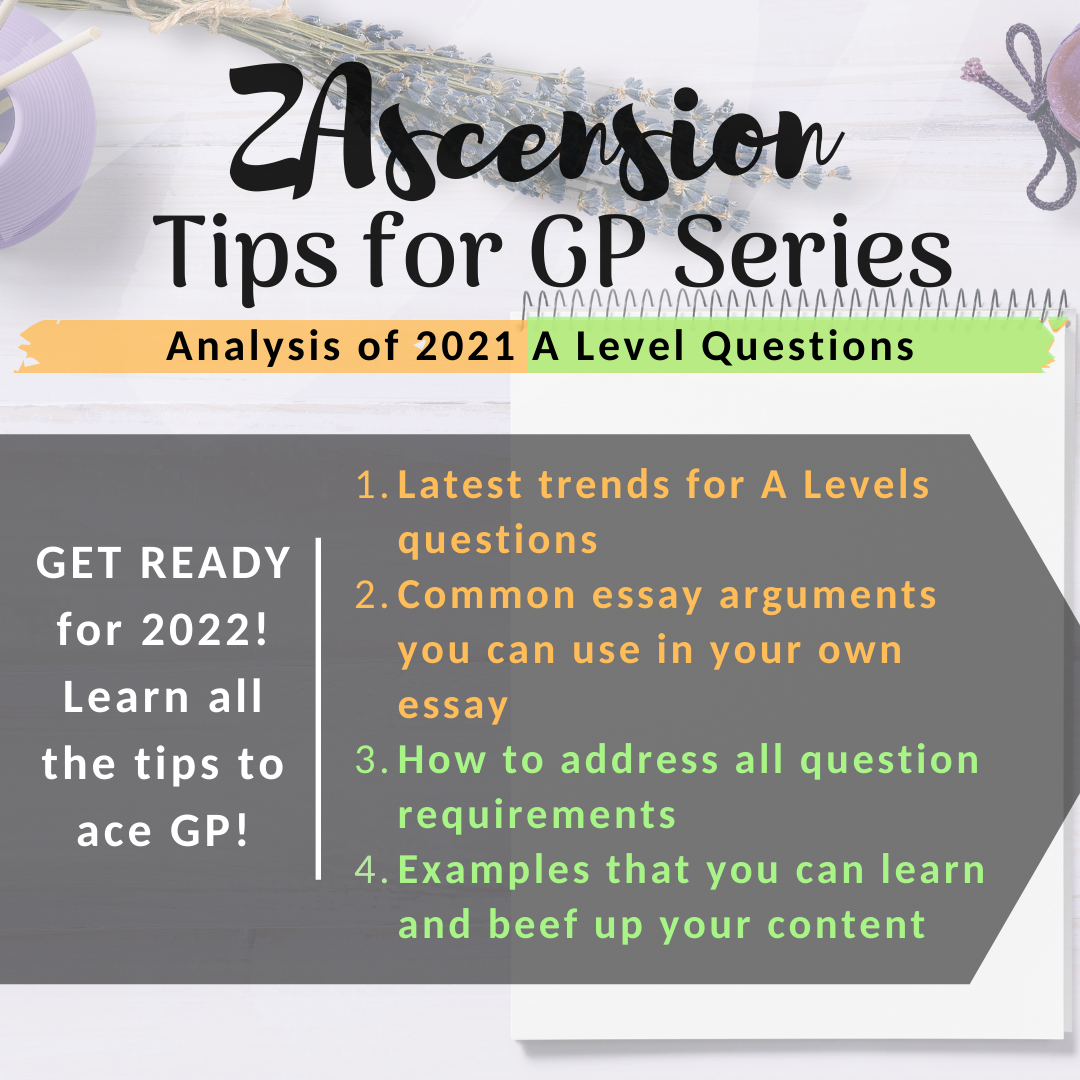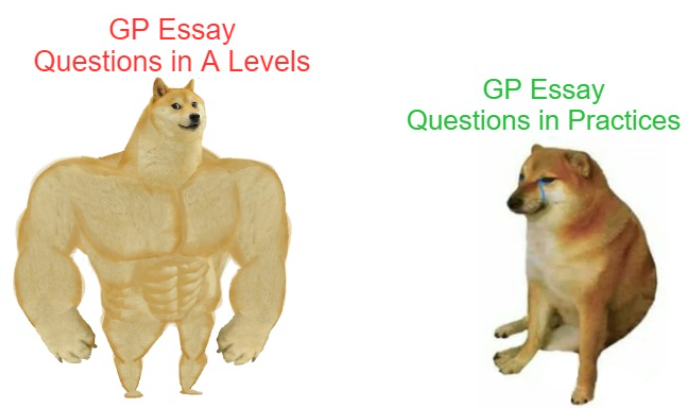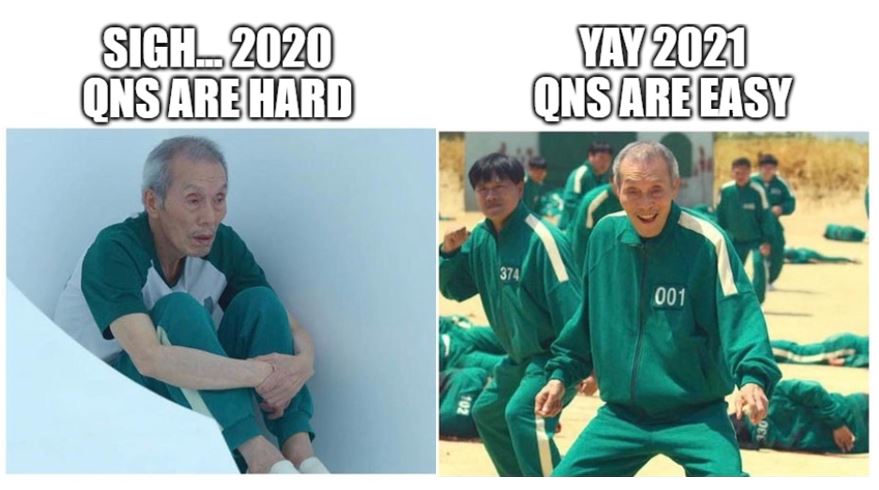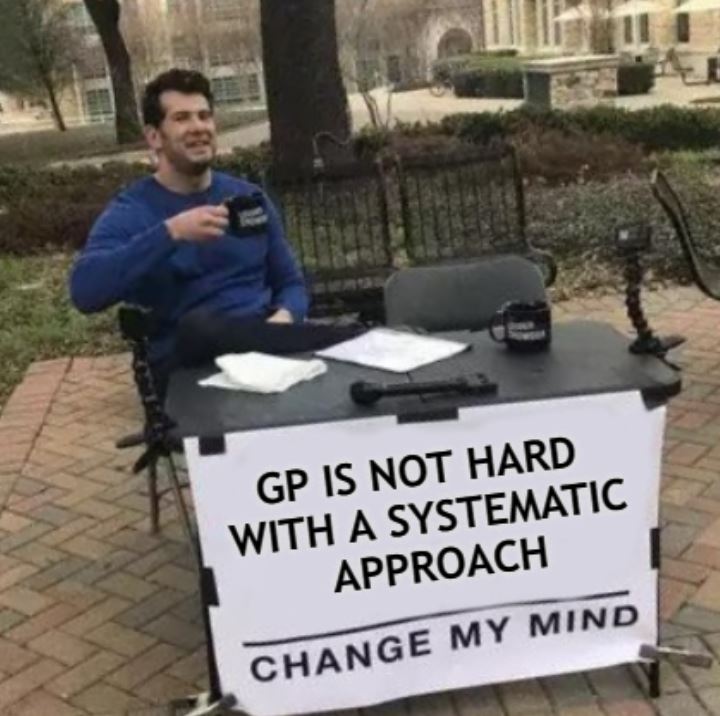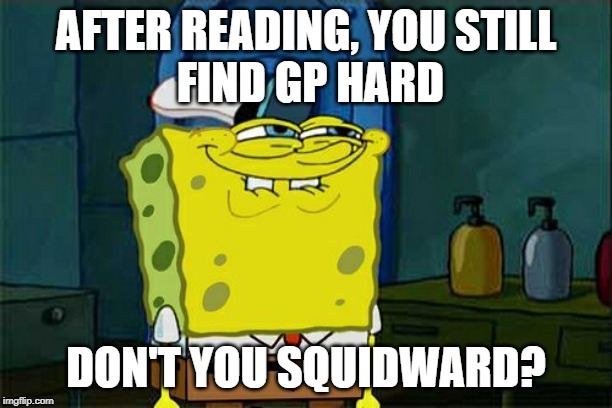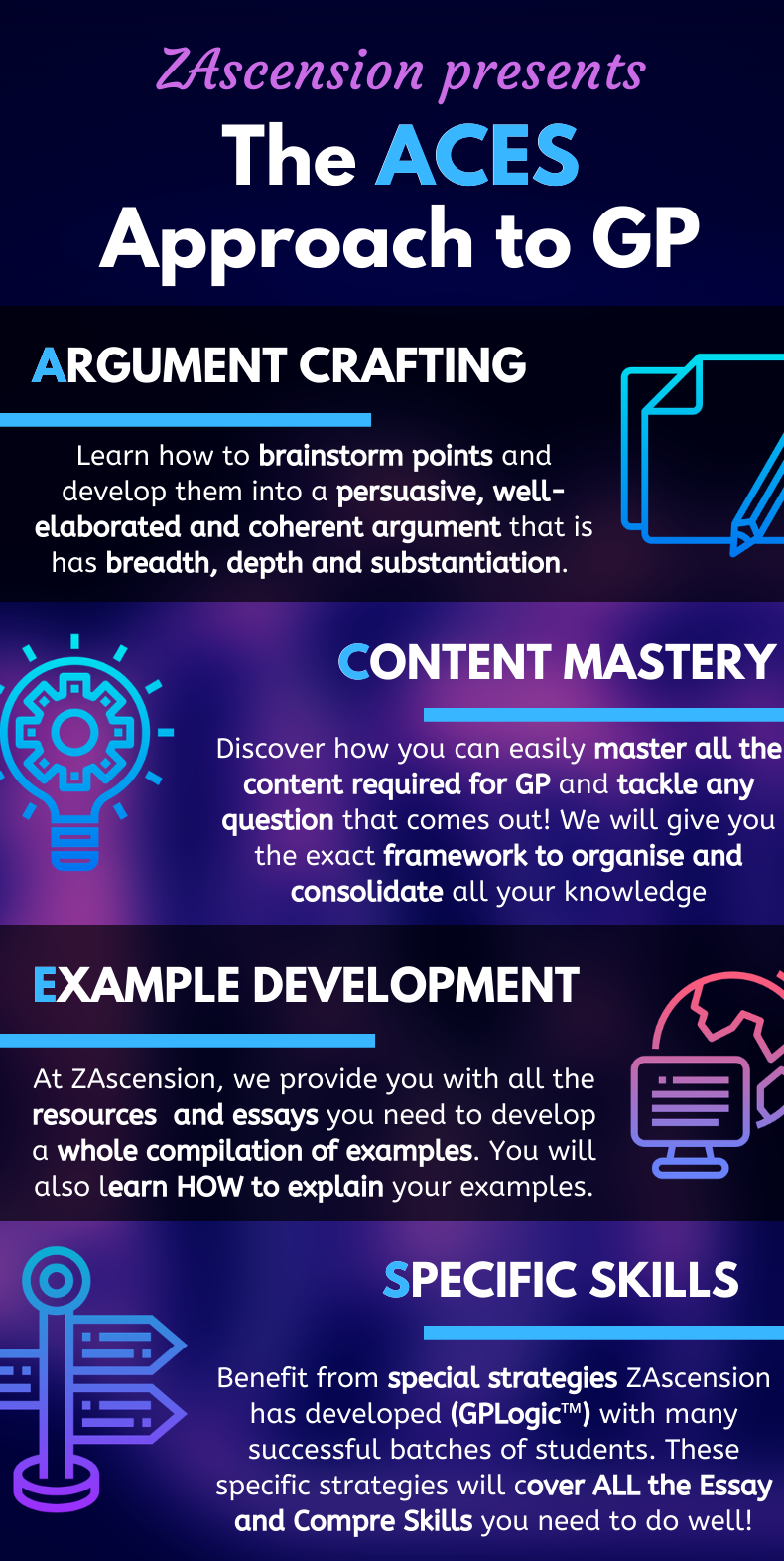GP Essay Questions from 2021 A Levels
If you want more Tips for GP, do also join this free Telegram channel which would share very helpful Tips, FAQs, and update you when articles are updated/posted 😃
1. How far is the pursuit of happiness the most important human goal?
2. Scientific advancement breeds complacency. How far do you agree?
3. ‘Power these days lies more with the people than the politicians.’ To what extent is this true?
4. To what extent has social media devalued true friendship in your society?
5. To what extent is charitable giving desirable?
6. ‘Films are concerned with escaping from the problems of everyday life, rather than addressing them.’ Discuss.
7. ‘What an individual eats or drinks should not be the concern of the state.’ What is your view?
8. Is news today reliable?
9. ‘The arts are nothing more than a luxury.’ How far is this true of your society?
10. ‘Staging major sporting events brings nothing but benefits to the host countries.’ Discuss.
11. Are global tourism and travel still necessary when everything can be experienced or achieved online?
12. ‘Advertising is largely about persuading people to buy what they do not need.’ How far do you agree?
______________________________________________________________________________________________________
General Insights:
Why do A Levels Essay Questions always seem so much more difficult that Practice/Prelim ones? Is it true that they are more difficult? The good news is they are actually easy if we analyse them and think about the strategies!
Strategies = Content + Skills. This two-pronged is exactly what we focus on at ZAscension, helping students acquiring specific Thematic knowledge while developing extensive skills that will greatly enhance the quality of essays.
Here is the spread of questions according to Themes (note that there are 13 because Q3 has 2 Themes).
Sci Tech (1): Q2
Media (3): Q4, Q8, Q12
Arts (2): Q6, Q9
Politics (2): Q3, Q7
Individual-Values (3): Q1, Q5, Q3
General (2): Q10, Q 11
Studying for GP Content through Major Themes is highly recommended
I have always been sharing with students that my approach in Content Knowledge for GP resides in preparing for major themes. It gives us a systematic method of acquiring knowledge that we would need and ensures that our knowledge can directly be applied to questions. The 2021 GP A Levels has confirmed, once again, the importance of these major themes. The themes stated above are precisely the ones I have identified all along, and you can see that’s how we organise all the past year Prelim and A Level questions too.
For easy access, here are the links to other past year questions organised based on Themes: 2020 A Levels, 2019 A Levels, 2020 Prelims, Prelims Compilation from different years
Back to 2021 A Levels, out of the 12 questions, 10 of them belong to the major themes. This is why it is important to be strategic and focus on these major themes instead of working on other niche topics. Niche topics that I often tell students to avoid include: poverty, family/social, crime & punishment, business/economy. Out of the 2 General questions, 1 on Travel is a heavily predicted topic and 1 on Sports events is slightly more niche. The insight from here is that the dominant GP strategy is to take a focused approach in developing a critical understanding of these Themes and the associated issues found in them.
Very intriguingly, the general difficulty of 2021 questions is much lower (good news for the J2 this year!!) than last year because there are fewer niche questions or cross-theme questions. In fact, there is not really a cross-theme question except Q3 that looks a bit at individual activism. Other than that, questions are standard and belong solely to one theme. It rewards students who have specialised and comprehensive knowledge about a specific theme
Skills are important to help us address varied questions requirements
Question requirements are often complex with modifiers (additional requirements) and there could even be more than one modifier.
Interestingly, ALL questions this year have at least 1 modifier. Even the shortest question Q8 has a context of ‘today’. This demonstrates the importance of properly analysing questions such that we sufficiently address all the additional requirements 🙂
Q1: Absolute | Q2: Extent | Q3: Variables | Q4: Extent, Context | Q5: Extent | Q6: Variables | Q7: Variables | Q8: Context | Q9: Context | Q10: Absolute | Q11: Variables, Context | Q12: Variables
Context: Q4, Q8, Q9, Q11 | Absolute: Q1, Q10 | Variables: Q3, Q4, Q6, Q7 | Extent: Q2, Q4, Q5
Here is a quick summary of the skills needed (CAVE):
Context/Condition = Examples and arguments need to reflect the context and not just ignore it. This includes ‘in your society’ questions because they are only looking at the specific context of Singapore.
For example, for Q11, students might make the mistake only ignoring the context. Let’s say BP1 explains the benefits of travel without acknowledging the context of online experiences. This would not Answer The Question (ATQ) because showing the benefits of travel do not immediately mean these benefits cannot be replaced by online experiences.
Absolute = One view needs to express the absolute. The other view questions the absolute. For example, for Q1, View A = happiness most important | View B = happiness not most important (questions the absolute). For balance, both views need to be considered.
Variables = Both variables always have to be addressed together, in each argument/example. We have to remember to always keep a vigilant lookout for the existence of such additional requirements, instead of eagerly jumping into thinking of points! Look at the following section for more details.
Extent = Need to show how both views could be valid to a degree. Avoid phrases like ‘I agree to a small/large/certain extent’ because they are too vague. Instead, give the specific extent of why you have chosen one view over the other.
Questions with double variables are common curve balls
Q3 (People vs Politicians)
Q4 (Social media & Friendship)
Q6: (Escapism vs Addressing problems)
Q7 (Individual & State)
The key to addressing such questions is to understand that the Scope of our essay has expanded into additional areas of concern. For instance, in Q4, we cannot simply discuss the pros and cons of social media without linking back to its impact on friendship. Both our examples and arguments would need to actively address both variables.
Similarly, in Q6, we would need to examine how viewpoint A looks at films focusing on escapism and viewpoint B looks at films confronting and addressing the problems of reality.
Double variables questions are harder because we have an additional requirement to consider. Note that every single body paragraph (BP) needs to address both variables and compare them. The common mistake is to separately discuss them across different paragraphs; it is problematic because the arguments would lack the comparative element.
Major and Minor Themes
Based on analysis of only Past A Levels questions, the 3 most major themes are Arts, Sci/Tech, Politics. Media and Environment are also major themes but recent questions trends have been somewhat extreme.
It is incredibly peculiar how Environment questions have not come up for 4 consecutive years in a row, despite the ongoing discourse around sustainability and climate change. I am not sure why this is the case but it would mean that we need to prepare for more than 1 major theme to ensure that we are able to confidently answer at least 1 out of 12 questions. One explanation is that it is already included in Paper 2 Compre where we look at fashion and the environment.
Media is strange because Media has been entirely missing in 2014 and 2018 but had two questions in 2019 and another two questions in 2020. And wow, this year there are actually 3 questions for Media! Media may soon become part of the most major themes because of the increasing importance of social media and its corollary issues (fake news, privacy infringement, social activism etc.). Though, do note that social media is only 1 out of 3 in this year’s questions. Q8 looks at all forms of news (both online and traditional), Q12 also looks at all forms of advertising.
Additionally, Individual-Values is a great theme to look into. This is not a common theme used by schools but I have coined this term because I found huge similarities in questions that can be categorised under this theme. For more information, please refer to the past year questions (links provided above, and also all the way at the bottom of this page). This year Indv-Values has three questions, focusing on the values of happiness (Q1), charity (Q5), and individual & bottom-up activism (Q3). We will talk more about these questions in the specific analysis below.
If you want more Tips for GP, do also join this free Telegram channel which would share very helpful Tips, FAQs, and update you when articles are updated/posted 😃
______________________________________________________________________________________________________
Specific Analysis:
I will be analysing each question for their unique requirements, highlighting some pertinent issues, and sharing possible arguments. Disclaimer: these would of course not be the only points that are accepted. If you thought of a different point, it might be a strong argument too, don’t worry just because it is not found here. I just wanted to share some points to open up perspectives on how we can approach these different 2021 questions.
1. How far is the pursuit of happiness the most important human goal? – Difficult
- This is a standard question that looks at the importance of happiness. It is an Indv-Values question because when we think about happiness, a substantial part of our examples would relate to individuals. Of course, we can consider happiness on a larger societal level but that would not paint the full picture of why happiness might be important. What is its specific value for us?
- Given that there is an absolute, one of the views would need to prove that it is indeed the most important human goal. Implicitly, this requires us to compare with other human goals that are equally important, but somehow happiness still emerges as the most dominant goal we should strive towards. Other possible human goals include: having a decent standard of living, acquiring material comforts, prioritising stability, pursuing knowledge, developing empathy, serving the needs of others.
- The other view would limit the absolute and explain the exact extent that is more viable, situated among other goals.
- Agree = Importance of mental health as a core foundation that provides the right state of mind to pursue other goals | Happiness is too often sacrificed as a trade-off because it is often not foregrounded as a priority
- Disagree = Could be too self-centred and hedonistic and we are living in an increasingly social and interconnected world that requires empathy for others| Happiness is a concept can be too subjective which makes it difficult to have it as a goal (could look at more objective and tangible outcomes)
2. Scientific advancement breeds complacency. How far do you agree?
- Quick thing to note that scientific advancement (SA) focuses more on the knowledge aspect. However, the advancement part also considers the application aspect (i.e. technology). It is okay to use examples that have both aspects; it is not okay to use examples only relating to technology (e.g. phone apps, social media)
- The first step that would make it much easier is to realise that this question is ultimately evaluating the impacts of SA. However, this is the only Sci/Tech question of the year, it is of course slightly more challenging than a standard question. We have to evaluate impacts, in the specific context of complacency. In other words, complacency = being excessively satisfied with our current progress, failing to recognise potential dangers, unwilling to look at possibilities of change and improvement, overconfidence. All impacts would need to link back to some of these interpretations, either because it leads to complacency or it does not
- Agree = Remarkable breakthroughs and newfound capabilities engender a false sense of security | Excessive dependence on SA to solve our problems and being blind to other root causes | Futuristic advancements perpetually offer new possibilities that makes it easy to forget about potential issues that could surface
- Disagree = Significant discourse and action around regulating SA | There are still gaps/problems that SA cannot address, which makes us keenly aware of its limitations | SA itself is a source of new problems and complications, forces us on a quest of always trying to improve SA
3. ‘Power these days lies more with the people than the politicians.’ To what extent is this true? – Difficult
- When we get a broad question with a very loaded term like “power”, we need to first analyse what power is. Power means being able to determine what happens in a country (i.e. rights protected, future direction, policies, legal restrictions). Be sure to also point out that there are various different political contexts. We should discuss both democracies and more authoritarian/dictatorial states
- A useful tool to brainstorm points here would be to recognise that even though there are key difference between people and politicians, they are inextricably intertwined because of the social contact theory. In other words, people can affect what politicians decide and what politicians decide will affect the lives of people
- We can also look at how power is actually shown by both parties. Power from the people comes mainly from social movements and elections/voting (in democracies). Power from politicians come from policies enacted and legal instruments. The context of “these days” would of course trigger us to think about social media
- Remember to compare between both variables in every BP to determine who has more power
- Agree = Importance of social movements where their traction would exert significant pressure on events transpiring (many examples of tangible change being engendered by social movements that are ground-up and pushed by the people) | Politicians catering to populist views of the majority to garner votes (which is why the concept of tyranny of the majority exists)
- Disagree = Social movements may not always yield the desired outcomes (especially in more authoritarian or dictatorial countries where they tend to be suppressed) | Policies and legislation are pre-existing and people are always in a reactive position where they can only express how they feel but what is pre-determined is by politicians
4. To what extent has social media devalued true friendship in your society? – Difficult
- This is a question that seems quite easy because it is in the familiar territory of social media. Yet, it is challenging because the context of ‘in your society’ severely limits other more global examples of social media activity (be sure to identify some key SG characteristics). Also, it is the standard “impact of social media” question except that the impact needs to be linked back to a narrow space of friendship, which again precludes many other common arguments
- Impact on friendship is actually quite difficult because it is hard to think of examples that can prove that friendship has been impacted. How would we know? Friendship is typically something personal and existing perpetually in the background
- To provide substantial scope, we need to think about what true friendship entails. A useful method is to first consider why this question even exists, why is this being asked? Often, social media is perceived to have undermined the quality of our friendships and communication because it pushes them into the digital space which can be quite limited. True friendship typically suggests that it has to be a meaningful and in-depth connection that is mutually supportive for both parties, and of course it should be sustained in the long run and not just a fleeting encounter
- Agree = Concerns of it being more superficial where our connections are extensive but not in-depth | Ways of maintaining friendships has become excessively reliant on online interaction, sacrificing in-person interaction (especially in times of COVID), the short distance of Singapore makes it unreasonable to not engage in face-to-face interaction
- Disagree = Social media is used to complement existing ways of building and maintaining friendships, enhances instead of devalues | Useful in a cosmopolitan state like Singapore where friendships can often happen across borders and social media becomes an indispensable tool for such long-distance relationships (even more so with globalisation normalising this)
5. To what extent is charitable giving desirable?
- A standard question that looks at the importance of being charitable which links to other related values of empathy, altruism, generosity, some degree of selflessness, philanthropy, volunteerism
- Such questions are easy to address because they are simply looking at pros-cons of this particular value, without additional requirements of a specific context or some additional variable to consider
- The important thing to note is from whose perspective are we talking about when we look at desirability? We can of course some benefits to self (perhaps the joy of giving is correlated with happiness), but the central focus on this question is still on the recipients because they are the main beneficiary of charity and philanthropy
- Agree = Helps to alleviate inequality which has become a substantial problem in many countries in recent times | Value lies in not just the act of giving, but also in the kind of attitude we have towards the needs of certain marginalised groups (empathy and compassion are crucial in a society) | Helps to address the plight of those who may have fallen through the cracks (recognising the state and organisation-based charity efforts may not be entirely sufficient) | Yields personal benefits (correlated with happiness)
- Disagree = Charity does not solve the root cause of social problems (it could even detract from it) because it merely addresses the symptoms or the situation of individuals but not larger systemic issues| Extent of desirability limited by the actual processes designed to safeguard the integrity and transparency of charity, intent does not always translate into outcome (must ensure that funds are not being siphoned away by corrupt individuals) | Can also be limited by how funds are being allocated (what causes, who benefits?)
6. ‘Films are concerned with escaping from the problems of everyday life, rather than addressing them.’ Discuss.
- This is an easy arts question and of course my favourite question in the entire list because it has a huge personal significance to me 😍 My actual A Level question in 2014 is totally similar to this question (I have even uploaded that replicated essay here):
- Do films offer anything more than an escape from reality?
- For arts question that evaluate the function and impact of a specific art form (in this case films), it is invariably much easier to take a more positive perspective where our main stand highlights different points of how films can be valuable in helping to address problems around us
- “Problems of everyday life” is also a favourable area of concern because it is broad enough to include many different kinds of problems: stress and mental health issues, discrimination, declined interest in heritage and history because we are preoccupied with the routines of everyday life, personal development and becoming a better person (more reflective, more critical, more empathetic), existential questions about the meaning of life (human condition)
- Agree = Focus of films is on aesthetic visuals, sound effects, and immersivity, creates an experience of escapism just as a much-needed respite from the stresses of life (precisely to take a break from problems) | It depends on the genre of films, there are many that only seek to entertain, with that being the primary or even the sole function (entertainment means not thinking about problems) | Fleeting duration of films makes it difficult to suggest it is able to solve problems
- Disagree = Problem-solving done by films is nuanced where it happens over time, impact of film goes beyond the escapist duration to convey important lessons that help in personal growth | Films are powerful social commentaries that can profoundly shape attitudes and catalyse social change, film issues and subject matters tend to be influenced by the existing zeitgeist and social milieu | Offers moments of introspection that get us to think more deeply about our lives and introspect on ideas of the human condition and human psyche
7. ‘What an individual eats or drinks should not be the concern of the state.’ What is your view? – Difficult
- “Eats or drinks” sounds like two variables but we can actually merge them into the idea of consumption and dietary habits. Merging variables, when appropriate, makes it easier to address the question
- For such a question, it is likely we immediately have an intuitive view that it is something too private and does not concern the state. At the same time, we need to take a step back to ask why this question exists. The larger concern behind is about how there are consequences for such actions. Governance is always concerned with this tension between giving enough freedom while having an ideal amount of control that tries to steer the country towards certain desirable outcomes
- Another related trend could be looking at whether governments should eventually push for alternative diets that cut down on meat consumption (this is a common contemporary advocacy issue)
- The question here becomes: what determines this delicate balance for governance? What would it depend on? What perspectives matter?
- Agree = Fundamental freedom that the individual should have (it is something personal and related to the body, there are also views advocating for body positivity and acceptance) | Neoliberal economies are characterised by individuals having the freedom to choose, free-market approach with decreased government intervention
- Disagree = Individual actions surrounding consumption can directly affect health which is a major concern of governments since healthcare spending can be substantial | Beyond the individual, consumption can involve societal-wide impacts (i.e. social problems, environmental concerns)
8. Is news today reliable?
- My general sensing is that many students might have attempted this question because media questions are often more popular than other themes
- This is a question that I have been predicting since a couple of years back. It speaks to the larger issue of fake news where the spread of misinformation and disinformation could severely undermine the credibility of news
- Yet, we have to remember that reliability is also determined by other factors. Is news excessively sensationalised to only focus on certain more frivolous or dramatic content? Is news reporting plagued by certain biases and framed in problematic ways?
- The important thing to remember is the “news” is a general term that includes the context of the mass media where news exist in different forms and are conveyed through different mediums. Essay should not only discuss social media and the internet without thinking about the larger scope
- On the issue of scope, the essay should also think about the increasing polarised media environment where users only receive news from some “trusted” sources which may actually be biased (i.e. the phenomenon of echo chambers)
- Also, “news” can be quite niche because it has to relate to information about recent events. It excludes other kinds of media content (e.g. advertisements)
- Agree = Fact-checking process and ensuring the quality of information is something upheld by media agencies who are concerned with reputation, especially with growing concerns of fake news | Increased regulation from governments and large platforms to combat fake news
- Disagree = User-generated content and citizen journalism are also included in the media landscape of news and these do not go through the stringent checking processes in media agencies | Political biases have seeped into different media outlets and platforms and the polarised news environment makes it challenging to ascertain the reliability of information (issues of echo chambers and algorithms or bots promoting fake news) | Governments and platforms may also be complicit in the propagation of fake news | Technology allows for the doctoring/falsification of information and masquerading it as credible
9. ‘The arts are nothing more than a luxury.’ How far is this true of your society?
- This question is a standard one from the theme of arts that looks at affordability and accessibility. Take note of the absolute because it requires one view to prove that is indeed only a luxury
- This leads to the logical question of asking what else can the arts be. Instead of being a luxury, the arts can be a necessity or public good where it has value for the common man (not just an esoteric or privileged group)
- Since it’s an “in your society” question, it would be helpful to ponder the defining characteristics of the local arts scene, including events, actual works of art, amount of state funding, general public interest in the arts, types of local art forms found in the umbrella term of the arts
- Agree = Privilege for the rich because it requires time and money to enjoy it (especially in the realm of fine arts that can be expensive), it may also be viewed as something frivolous that does not fit into the fast pace of life in Singapore | The relative lack of focus in arts education would mean that not everyone is equipped with the knowledge and skills needed to appreciate the arts
- Disagree = Technology has revolutionised the affordability of the arts where one does not have to physically own art pieces to enjoy them (many can be accessed online either for free or at a low price) | Many local art events are subsidised to encourage participation and appreciation of the arts | The arts include an entire range of works beyond just the more expensive realm of fine arts (local works tend to be more inclined towards the contemporary avant-garde style) | Serves a real function (not just a luxury because luxury implies that it is merely a past time on the side); it is actively used for social commentary in Singapore
10. ‘Staging major sporting events brings nothing but benefits to the host countries.’ Discuss.
- The glaring term is of course the absolute. It can be quite a mouthful and hard to understand. Hence, we should rephrase it to something that makes more sense: brings only benefits. Does staging major sporting events brings only benefits?
- This is a simple question if we have some specific knowledge about the recent examples of major sports events around the world
- Again, questioning why the question exists helps illuminates some of key issues. Many countries are willing to invest heavily into such events, both in terms of obtaining the rights to hold such events and in terms of the actual budget for the event. So, why are countries so fixated on such events? What are the costs and can we think of costs as something beyond just financial costs?
- Agree = Major sporting events have a lot of prestige and host countries enjoy the surge in international reputation and image | Major sporting events would also attract crowds from all over the world which means significant tourism spending that could be beneficial for the economy + profits from ticket sales
- Disagree = Sporting events tend to take up a lot of space and in countries where space is lacking, this could mean displacement of certain marginalised groups to make space | Cost of bidding for and actually hosting the event may be too substantial for a country to afford even with sponsorships
11. Are global tourism and travel still necessary when everything can be experienced or achieved online?
- Tourism and travel is another aspect I have been predicting because it is a universal idea that will always be relevant
- The COVID-19 pandemic has of course impacted this too, such that we are relying on more virtual experiences to compensate for this loss of geographical mobility
- The central debate here is whether there are some benefits of physical travel that simply cannot be replaced by online experiences.
- View A would suggest that despite advancements in technology, online experiences cannot fully replace travel. View B would express opinions that travel has a declined importance (not as necessary) with the richness of digital experiences
- Take note of how the context of online experiences is constantly addressed in every single BP
- Agree = Physical travel and physical environments have aspects that cannot be fully encompassed by online experiences (multi-sensory experience) | Global travel also involves the social component of interacting with locals, some of whom do not have much presence online | The act of physically going overseas is also an important break from the routines of life where we become more open to appreciating new experiences, changing our perspectives, and having some takeaways (online experiences are too ordinary because they are readily accessible) | Idea of the tourist imagination where overseas experiences are always seen as more exotic and appealing (online experiences only serve to fuel the tourist imagination instead of satisfy it)
- Disagree = Technological advancements have sought to recreate spaces to an immensely realistic degree, especially with VR and AR technology (can even recreate spaces that have been destroyed or removed) | Online experiences have the possibilities of going beyond what is physically available in the world (e.g. experiences relating to history, fantasy, sci-fi)
12. ‘Advertising is largely about persuading people to buy what they do not need.’ How far do you agree?
- Questions about advertising have not appeared for many years in the A Levels but this year it made a comeback
- This is another perennial concern when we think about the media. In fact, it is a very popular question in the past when there were concerns surrounding advertisements being manipulative
- Some knowledge about the ongoing sustainability conversation would be helpful where advocates have criticised modern consumerism and materialism for our incessant consumption. This behaviour is indubitably influenced by advertising that drives demand for certain products and services
- Agree = Emotional manipulation is a common technique used by advertisers to encourage consumption, some advertisements are even accused of resorting to subliminal advertising (tapping on our subconscious), or artificially enhancing products with the precise intention of convincing consumers they need the product | Advertisements often accompany the latest available technologies and products, which may inherently be items that we do not need (companies release them for profit, not to address real needs). Advertisements come in to convince us of the need
- Disagree = Consumers are getting more savvy and discerning with the amount of available information, advertisers would have to satisfy a real need for it to be attractive | Advertising may not always relate to businesses; it is also extensively used by advocacy groups to try and evoke social change (need not involve buying, it could just be about behavioural or attitudinal change)
______________________________________________________________________________________________________
Yay, congratulations to the J2s of 2021, because you have completed an important milestone. Good job on putting in your best effort for GP. Now it is time to take a short break and refocus your efforts on the remaining papers. Stay motivated and stay confident 😄!!
______________________________________________________________________________________________________
If you found this helpful, do check out our new GP Tips & Resources Telegram Channel! Click here to join. This channel is meant to act as a GP companion to share knowledge and help all students, regardless of whether they are a part of ZAscension. This resource features Tips of the Day, Answers to FAQs, Articles and many more. So if you enjoyed this article, this channel will definitely be useful for you 😃
Do share this article and also the Telegram channel with everyone you know who is also studying for GP, let’s share the good stuff so that we may all learn 🙂

